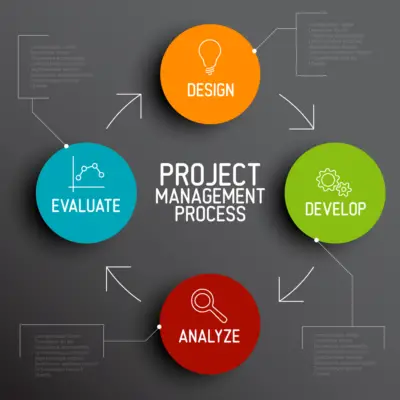The journey to becoming a project manager requires an inherent understanding of the healthcare industry and expertise in project management principles.
This is a multifaceted role where one must grasp the underpinnings of healthcare laws, regulations, systems, and medical terminology while also mastering crucial project management aspects such as planning, execution, control, and closure of projects.
Beyond these fundamental skills, it is indispensable to possess relevant certifications and hone leadership skills, which can significantly bolster your professional standing and capacity to lead teams effectively.
Understanding Healthcare Industry
Understand the Basics of the Healthcare Industry
To become a competent healthcare project manager, start by building a solid foundation of basic knowledge about the healthcare industry.
This includes a comprehensive understanding of healthcare laws, regulations, systems, and policies.
Equip yourself with knowledge about the principles of health and disease, the structure and function of healthcare systems, and healthcare professionals’ roles and responsibilities.
Familiarize Yourself With Medical Terminology
Understanding medical terminology is crucial in the healthcare industry as it aids in effective communication and reduces misunderstandings.
As a project manager, you must familiarize yourself with common terminologies for diagnosing, treating, and managing various health conditions.
This knowledge will be beneficial when managing healthcare projects, providing clear instructions to the team, and conveying important information accurately.
Keep Up with Recent Changes and Trends in Healthcare
The healthcare industry continually evolves with new laws, regulations, and trends. Stay informed about the ongoing changes by reading industry publications and attending workshops, seminars, and conferences.
Be aware of new laws passed that may affect how healthcare systems function. Regularly update your knowledge on the latest treatments, methods, and healthcare industry shifts to ensure the best decisions for your projects.
Understanding Health Insurance and Payer Systems
Healthcare project managers should understand the intricacies of health insurance, billing, and payment systems.
They should be aware of how health insurance companies operate, payment models, reimbursements, and the financial aspects of patient care.
This understanding will enable the project manager to manage resources efficiently and effectively, ensuring the successful execution of healthcare projects.
Learning about Electronic Health Records (EHRs)
With the digitization of health records, understanding Electronic Health Records (EHRs) is crucial.
EHRs are a comprehensive digital record of a patient’s health information.
A healthcare project manager should understand how these systems work, their benefits in improving patient care, the latest software, and information security measures to protect patient privacy.
Embrace the Power of Healthcare Data
Data plays a significant role in healthcare. It aids in improving patient outcomes, streamlining operations, and enhancing medical research.
As a healthcare project manager, you should know how to interpret, analyze, and use healthcare data. This includes understanding data privacy regulations, healthcare analytics, and emerging technologies like artificial intelligence in healthcare.
Becoming a healthcare project manager requires a deep understanding of the healthcare industry’s dynamics.
Arming yourself with the knowledge of its various aspects, you will be well-equipped to navigate and manage complex healthcare projects.

Project Management Principles
Identifying the Purpose and Scope of the Project
To become a successful healthcare project manager, you must understand the project’s purpose and scope.
The purpose refers to the intended final output or product, while the scope refers to the breadth or extent of the project in detail.
Once you have these details, you can plan accordingly, prioritizing tasks and resources.
Mastering Project Planning
Planning is the cornerstone of project management. A well-defined project plan outlines key objectives, performance criteria, deadlines, and resource allocation.
Begin by identifying all tasks that need to be completed, estimating how long each item will take, and who is responsible for them.
Make sure to include key milestones and deliverables in your plan.
Executing and Controlling Projects
After planning, the next stage is executing the plan while managing any changes. As a healthcare project manager, you will be responsible for keeping everyone on-task and managing the day-to-day operations of the project.
This may involve regular meetings, status updates, and discussions regarding any changes or obstacles.
Controlling the project involves tracking progress against the project plan and making adjustments as necessary.
Understanding Risk and Quality Control
Risk management is a critical component of project management. It involves identifying potential risks and developing strategies to mitigate them.
Quality control, on the other hand, ensures that the deliverables meet specified criteria. Regular reviews, audits, and testing can ensure you maintain the quality of outcomes.
Learning Cost Management
Knowing how to manage the costs of a project is also an important skill for a healthcare project manager.
This involves estimating costs, setting budgets, and controlling costs during the project. Regular financial reporting and scrutiny of expenses can help avoid cost overruns.
Improving Communication Skills
Effective communication is key to managing and completing projects successfully. Regular, clear, concise communication among team members, stakeholders, and external service providers is crucial.
This includes managing expectations around progress, risks, and potential issues that may arise.
Closing Projects
Finally, successful project management involves correctly closing out a project, which may include formally accepting deliverables, releasing project resources, and carrying out a post-project review.
This phase provides an opportunity for the team to learn from the project and improve for future projects.
Understanding and applying these principles, you’ll be on your way to becoming a successful healthcare project manager.
Remember, like any skill, project management requires practice and patience. Do not be disheartened by setbacks. Instead, use them as learning opportunities to improve constantly.

Earning Relevant Certifications
Obtain a Bachelor’s Degree
Start your journey to becoming a healthcare project manager by earning a bachelor’s degree. This degree could be in a healthcare-related field, business, or healthcare administration.
The degree provides the foundation for understanding business principles, essential for managing projects effectively.
Gain Experience in Healthcare-related Projects
After earning a bachelor’s degree, it’s time to start building your professional experience.
Aim to find opportunities to handle healthcare-related projects to gain insights and practical knowledge.
This real-world experience will allow you to understand the different aspects and challenges of managing healthcare projects.
Become a Certified Project Manager (CPM)
After gaining substantial experience in project management, you should aim to become a Certified Project Manager (CPM).
Several institutions offer the CPM certification, such as the International Association of Project Managers (IAPM).
This certification will demonstrate your knowledge and competence in project management, making you a more attractive candidate to employers.
Acquire a Certified Healthcare Project Manager (HPM) Certification
This certification is specifically designed for project managers in the healthcare sector. It allows you to validate your skills in managing healthcare-related projects.
The examination for this certification tests various areas, including healthcare project planning, risk management, and stakeholder management.
Engage in Continuing Education and Professional Development
Since the healthcare industry is always evolving, professionals need to keep upwards with the current trends and regulations.
Attend conferences, workshops, or webinars related to healthcare project management. This would help you stay informed about the latest in the field and provide networking opportunities.
Consider an Advanced Degree or Specialized Certification
To increase your competitiveness in healthcare project management, consider pursuing an advanced degree, like a Master’s in Healthcare Administration.
Additionally, specialized certifications such as Lean Six Sigma could provide a distinct advantage by offering training in efficiency and waste reduction principles.
Remember, while certifications are beneficial, effective healthcare project management requires excellent leadership, communication skills and a deep understanding of the healthcare industry.
Recruiters often look for these qualities when hiring for project management roles in healthcare. Continue to hone these skills to excel in your career.

Developing Leadership Skills
Identifying Leadership Traits and Skills
Recognizing the essential leadership skills and traits is paramount to start becoming an efficient healthcare project manager.
These might include effective communication, conflict resolution, motivational skills, decision-making abilities, and the capacity to deal with stress.
Awareness of these capabilities will enable you to identify the areas needing your attention and development.
Enhancing Leadership Skills through Education
A solid educational base is a crucial factor in improving your leadership skills. You may consider enrolling in relevant courses such as project management, leadership and management, executive management programs, or even getting an MBA.
You could also take courses in healthcare administration, healthcare ethics, and law to enhance your knowledge of the healthcare industry.
Participation in Leadership Workshops
Workshops can act as a platform for skill enhancement and practical application. They also encourage interaction with individuals from different fields, providing different perspectives.
Participating in such workshops can improve a future project manager’s communication and motivation skills, conflict resolution, and decision-making abilities.
Self-Study and Real-Life Applications
Books, articles, and podcasts on leadership can help you understand the theoretical aspects of leadership skills. But, practising the skills in your day-to-day life could be more beneficial.
Volunteering for extra responsibilities, leading small projects, or mediating conflicts are some ways to implement and refine your leadership skills.
Seeking Mentorship
Finding a mentor experienced in healthcare project management can be immensely beneficial.
They can provide insights into the field and guidance based on their experiences. Regularly meeting with them, getting feedback, and taking their advice can help you apply your leadership skills effectively.
Joining Professional Groups
Engaging with professionals in the same field is another effective way to boost leadership skills.
Participating in discussions, sharing experiences, and exchanging tips can help you learn from others and implement good practices in your own work.
Self-Evaluation
Periodic self-evaluation is significant to assess growth and discover areas needing further development.
This process can involve keeping a leadership journal, collecting feedback from team members, or conducting formal assessments like 360-degree feedback.
This offers a rounded view of your leadership effectiveness and highlights areas for improvement.
Continued Learning and Adaptability
Leadership skills should not be viewed as static but as evolving capacities. As a healthcare project manager, remain open to new experiences, adopt best practices, and, most importantly, continue learning.
This constant evolution and adaptability will stand you in good stead as you navigate through the ever-changing landscape of healthcare project management.

Conclusion
Embracing the journey toward becoming a healthcare project manager inherently implies continued personal and professional growth.
It necessitates a deep-seated comprehension of the healthcare industry and its associated regulations and a firm grip on fundamental project management principles.
The vanity of relevant certifications cannot be overemphasized, as this brings credibility and offers practical knowledge that is quintessential in this role.
Furthermore, continuously sharpening leadership skills ensures that a healthcare project manager is consistently effective in motivating teams, resolving conflicts, and making crucial decisions.
All these elements combined pave the way to a successful career as a healthcare project manager, fostering quality healthcare service delivery.

Chris Ekai is a Risk Management expert with over 10 years of experience in the field. He has a Master’s(MSc) degree in Risk Management from University of Portsmouth and is a CPA and Finance professional. He currently works as a Content Manager at Risk Publishing, writing about Enterprise Risk Management, Business Continuity Management and Project Management.

